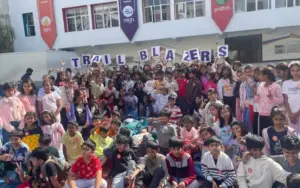Group Study: Benefits and Tips for Effective Learning
Group study is a learning style in which more than two students come together to learn, study, and understand the subject matter. The aim is to pool knowledge from different individuals and develop a deeper understanding of the material through discussion with different subject perspectives. This contradicts individual study, where one tries to learn based on personal experience.
Problem-solving and peer teaching are effective ways to understand things better and quickly. This can lead to greater comprehension of ideas, excellent communication abilities, and motivation. Group members help explain things to each other and also ask each other questions to find solutions. Therefore, enhanced awareness of the subject matter is achieved.
Benefits of a Group Study
Enhanced Understanding
A group discussion sharpens understanding with the possibility of different perspectives and problem-solving approaches from the participants. Several participants may make various contributions regarding insight, experience, or interpretation, making the discussion much more enriching. In such an atmosphere, students will most likely be more motivated to think critically as they challenge each other and try to clarify concepts. Explaining something to someone else strengthens one’s understanding. Group study, therefore, provides a dynamic learning environment whereby comprehension is improved through shared knowledge and mutual support.
Improved motivation
Engaging with the group members and discussing various topics creates a sense of membership and encourages everyone to contribute in their way. This would also create motivation and drive towards the goal because of the mutual support and encouragement of others within the same group working towards a common goal. Constructive feedback and healthy competition in the group can enhance performance even more. The group’s collective effort also enhances individual commitment and drives the team to success.
Development of Critical Thinking Skills
Group discussions improve critical thinking because participants get exposed to different ideas and points of view, questioning assumptions and issues from a deep level of consideration. Through debates and discussions, people develop their ability to use logical reasoning and arrive at more balanced solutions. Sharing ideas within a group enhances creativity and creates a broader understanding.
Shared Resources and Knowledge
Sharing resources and knowledge among group members results in collaboration, efficiency, and innovation. This approach reduces effort as every individual contributes to providing solutions. Each member brings diverse ideas to the table. It also builds a culture of trust and support where members feel valued and motivated. It enhances overall productivity and drives the group towards common goals more effectively.
Social and communication skills
Group study enhances interpersonal and communication skills by developing mutual understanding, collaboration, active listening, and idea sharing. Arguments and debates help improve communication clarity by explaining concepts to another person. One learns to appreciate different opinions, have empathy, and solve conflicts amicably. Students are encouraged to express thoughts, question, and creatively criticise points and build the vital skills for academic and professional success through regular interaction.
Group Study Tips
To make study sessions productive and efficient, some of the practical tips that can be followed are given below:
- Set clear goals and objectives.
Before starting, have a clear roadmap of goals and objectives for each study session. Goals refer to the targets one aims to achieve in a given period, while objectives spell out the steps that must be undertaken to achieve such goals. This clarity helps one prioritize, manage time well, and remain focused with little harmful distraction. It improves motivation by giving direction, and you feel satisfied that you accomplished a goal. Lastly, well-outlined goals and objectives transform study sessions from unplanned to goal-determined activities. This leads to efficient learning and improved academic performance.
- Choose the Right Group Members
Choose group members who are dedicated, responsible, and have similar objectives. Include students with various strengths that can help cover all the study material. Make sure they are communicative and ready to work cooperatively. These students need to be motivated, responsible, and have a positive attitude. That way, students will ensure their equal contribution and help each other, preparing a practical, balanced study circle.
- Organise and structure sessions
It is essential to indicate the proper target areas and objectives for each group study session. Assign, in advance, the topic areas or particular sections for preparation to every group member. An agenda with specific timings for group discussion, problem-solving, and review will be necessary. There should be a lot of participation and collaboration. Everybody should openly raise their concerns and contribute to fixing the problems. Take sufficient breaks to remain focused and energized. Make sure activities and the schedule are engaging. Use visual aids, charts, or slides to emphasize key concepts. Finally, summarise what was covered and assign tasks for the next session, ensuring continuity and progress.
- Encourage Active Participation
Assign work and responsibilities so that all members are actively involved. Provide regular input and feedback to make the sessions more engaging. Try to maintain an inclusive environment in which a difference of opinion is encouraged by providing constructive feedback, as this enhances the opportunity for enthusiasm and commitment to the group’s objective.
- Use technology and tools
Use technology and tools that make communication easy and improve group study or collaboration. There are various online apps like Zoom, Google Meet, etc., where you can chat and have a video conferencing session. Applications like Microsoft PowerPoint can also be used to revise bullet points or include visual aids. There are other platforms and apps to plan a study schedule online.
Common Challenges in Group Study
Group study is, at times, associated with problems like:
- Uneven participation: Some members will be loud, while others may not get the chance to be heard. Sometimes, a few members dominate the sessions.
- Conflicting timing: Mismatches in timing can lead to poor collaboration and productivity.
- Distractions: Deviating from the session agenda disturbs the group’s focus and can negatively affect group performance.
- Different pace of learning: Every member learns at their own pace. Sometimes, it may get difficult to either achieve a goal in time or slow down the entire progress of the group.
Managing Conflicts
Differences of opinion, dominance, varied pace of learning, clashing schedules, and arguments are common conflicts in any group. To tackle these, open communication, fixing a timetable, considering everyone, having clear goals, and equal distribution of responsibilities are some tips to reduce conflicts.
Ensuring Equal Participation
To ensure equal participation, members should be assigned roles based on their strengths and interests. Brainstorming the goals and objectives before the start of the session can be helpful. Seek feedback from quieter members and regularly give input. Lastly, periodically review the group’s dynamics and correct any imbalances.
Conclusion
The group study approach brings several benefits, such as better understanding, enhanced retention through discussion and teaching of the concepts, and increased motivation through shared responsibility. To guarantee success, define clear goals and roles, follow constrained timelines, and encourage effective communication. The group should be very active and focused, and any conflict within the group members causing a disruption must be attended to promptly. Additionally, diverse resources and tools that help learning should be applied, and progress must be monitored at specific intervals.
Frequently Asked Questions (FAQs)
- What are the main benefits of group study?
Critical thinking from varied perspectives helps in a deeper comprehension of the topic. Communication fosters the active study and retention of information. It boosts motivation to reach goals. It also contributes to developing communication skills and understanding topics better than independent study. - How can I make my group study sessions more effective?
Set clear objectives, assign clear topics to all the members, keep everyone organized using a clean agenda, ensure everyone is engaged, and monitor progress regularly. Use varied ways of studying so that it is exciting and helps maintain motivation among all the members. - What should I do if there are conflicts in my study group?Conflict can be managed by maintaining calm and listening to every viewpoint. Encourage accessible communication, emphasizing points about shared goals. Mediate the discussion and seek a fair compromise. If necessary, bring in a neutral third party. Solve problems constructively within the group to optimize productivity.






